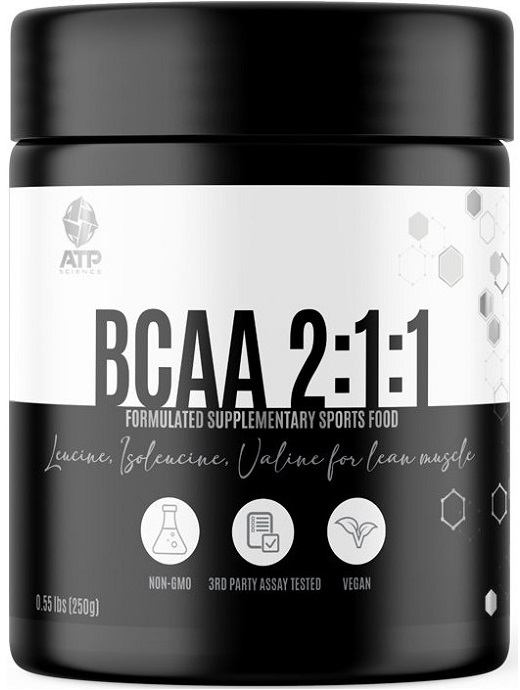ATP Science BCAA 2:1:1
ATP Science BCAA is a ratio optimised (2:1:1) branched chain amino acid product designed to enhance exercise stamina, replenish muscle BCAA stores, trigger mTOR for adaptation and reduce muscle soreness. This premium instantised powder may be added to pre, intra or post-workout drinks, or simply taken with juice or flavoured electrolytes away from exercise.
Product Features
- Instantised with Sunflower Lecithin (Not Soy).
- Tested for Allergens, Pesticides, Heavy Metals and Microbes.
- Naturally Fermented from Glucose from Non-GMO Corn.
- HPLC Verified: No Contaminants or Adulteration.
- Vegan, Gluten free, GMO free, Sugar free.

Branch Chain Amino Acids (BCAA) is one of the ‘must take’ supplements for building muscle. The three proteinogenic BCAAs are among the nine essential amino acids for humans, accounting for 35% of the essential amino acids in muscle proteins and 40% of the preformed amino acids required by mammals1. Among the proteinogenic amino acids, there are three BCAAs: leucine, isoleucine and valine. It is therefore hardly a surprise to hear that the BCAA’s are vital for optimal muscle growth, endurance and the reduction in muscle soreness.

The anabolic potential of leucine has been attributed to its capacity to stimulate translation initiation both dependently and independently of the mTORc signalling pathway. Interestingly, aging has been associated with impairment of nutrient-sensing signalling pathways. However, studies show that the postprandial phosphorylation of mTORc, and its downstream effector p70S6K, was more pronounced following long term leucine supplementation2. In addition to its effects on muscle protein synthesis, there is some evidence suggesting that leucine augments glucose-induced insulin secretion.
In animal models, chronic leucine supplementation improved insulin sensitivity despite the consumption of a high-fat diet3. As we age, it becomes for difficult for us to maintain and gain muscle mass. Leucine supplementation increases the potential for muscle protein synthesis in older adults and may make an otherwise insufficient or marginal quantity of meal-derived protein more biologically available for muscle tissue growth and repair.4
It is well documented that exercise-induced muscle damage (EIMD) decreases muscle function and causes soreness and discomfort. We have all been there! BCAA supplementation has been shown to increase protein synthesis and decrease muscle protein breakdown, however, the effects of BCAAs on recovery from damaging resistance training needed to be clarified. Therefore, a study5 was conducted to examine the effects of BCAA supplementation on markers of muscle damage elicited via a sport specific bout of damaging exercise in trained volunteers.
BCAA Research
Twelve males (mean ± SD age, 23 ± 2 y; stature, 178.3 ± 3.6 cm and body mass, 79.6 ± 8.4 kg) were randomly assigned to a BCAA supplement (n = 6) or placebo (n = 6) group. The damaging exercise consisted of 100 consecutive drop-jumps. Creatine kinase (CK), maximal voluntary contraction (MVC), muscle soreness (DOMS), vertical jump (VJ), thigh circumference (TC) and calf circumference (CC) were measured as markers of muscle damage. All variables were measured immediately before the damaging exercise and at 24, 48, 72 and 96 h post-exercise.
What happened?
here were significant group effects showing a reduction in CK efflux and muscle soreness in the BCAA group compared to the placebo (P<0.05). Furthermore, the recovery of MVC was greater in the BCAA group (P<0.05). The VJ, TC and CC were not different between groups.
What does this mean for you?
BCAA administered before and following damaging resistance exercise reduces indices of muscle damage and accelerates recovery in resistance-trained males. It seems likely that BCAA provided greater bioavailability of substrate to improve protein synthesis and thereby the extent of secondary muscle damage associated with strenuous resistance exercise. The dose used in this study was 10g of BCAA.
BCAA Summary
Supplementing BCAAs prevents a serum decline in BCAAs, which occurs during exercise. A serum decline would normally cause a tryptophan influx into the brain, followed by serotonin production, which causes fatigue. BCAA’s also help to reduce the muscle soreness and damage that occurs after intense exercise. BCAA also boost muscle growth via numerous growth pathways. Thus consuming a standard dose of BCAAs before and after exercise is virtually essential for optimal muscle growth and performance. If you exercise lasts for longer than one hour, consider pausing for a BCAA drink during your workout also.
How to Use ATP Science BCAA 2:1:1
For best results take 5g of ATP BCAA"s before, during or directly after training. ATP's instant BCAA powder can be added to your protein powder for convenience or is easily dissolved in water.
Customer feedback
Ingredients
ATP Science BCAA 2:1:1 Nutritional Information
Serving Size: 5g
| Nutrition |
|---|
| Energy |
| - |
| Protein |
| - BCAA |
| Fat, Total |
| - Saturated |
| Carbohydrates, Total |
| - Sugars |
| Sodium |
INGREDIENTS: >99% Leucine, Isoleucine, Valine (<1% Sunflower Lecithin added for instantisation).


